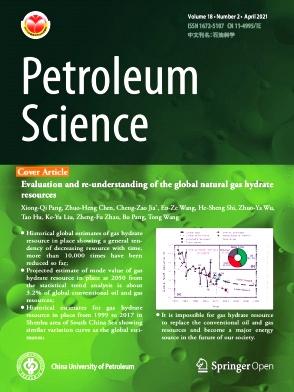Optimal depth of in-situ pressure-preserved coring in coal seams considering roadway excavation and drilling disturbance
IF 6
1区 工程技术
Q2 ENERGY & FUELS
引用次数: 0
Abstract
Using pressure-preserved coring technique to determine in-situ gas content provides a more precise assessment of gas resource reserves and safeguard of mining safety in coal seams. How coring technique and depth affect the determination of gas content is unclear due to borehole zoning rupture caused by roadway excavation and drilling disturbance. To this end, a proposed coupling model of stress distribution and gas migration was simulated and validated by FLAC3D and COMSOL Multiphysics considering superposition effects of roadway excavation and drilling disturbance. The findings indicate that the roadway surrounding rock displays distinct zoning features including stress relief zone, stress concentration zone that is composed of plastic zone, elastic zone, and original stress zone; and the broken situations depending on the borehole peeping are consistent with the corresponding simulation results. On this basis, this study proposes a set of drilling coring depth calculation and prediction model for the gas desorption affected area under engineering disturbance. Optimal depth of coring drilling is not only approach to the in-situ coal bulk, but also can get the balance of the drilling workload and cost controlling. According to the typical mine site geological conditions and the numerical simulation results in this study, if the roadway excavation time is ∼1 year, it is recommended that the pressure-preserved coring depth should be greater than 17 m.
考虑巷道开挖和钻孔扰动因素的煤层原位保压取心的最佳深度
采用保压取心技术测定原地瓦斯含量,可以更精确地评估瓦斯资源储量,保障煤层开采安全。由于巷道开挖和钻孔扰动造成钻孔分区破裂,取芯技术和深度对瓦斯含量测定的影响尚不明确。为此,考虑到巷道掘进和钻孔扰动的叠加效应,利用 FLAC3D 和 COMSOL Multiphysics 模拟并验证了所提出的应力分布和瓦斯迁移耦合模型。研究结果表明,巷道围岩呈现出明显的分区特征,包括应力释放区、由塑性区、弹性区和原始应力区组成的应力集中区;钻孔掘进造成的破碎情况与相应的模拟结果一致。在此基础上,本研究提出了一套工程扰动下瓦斯解吸影响区钻孔取心深度计算与预测模型。最佳钻孔取心深度不仅可以接近原位煤体,还可以兼顾钻孔工作量和成本控制。根据矿区典型地质条件和数值模拟结果,若巷道掘进时间为 1 年,建议保压取心深度应大于 17 m。
本文章由计算机程序翻译,如有差异,请以英文原文为准。
求助全文
约1分钟内获得全文
求助全文
来源期刊

Petroleum Science
地学-地球化学与地球物理
CiteScore
7.70
自引率
16.10%
发文量
311
审稿时长
63 days
期刊介绍:
Petroleum Science is the only English journal in China on petroleum science and technology that is intended for professionals engaged in petroleum science research and technical applications all over the world, as well as the managerial personnel of oil companies. It covers petroleum geology, petroleum geophysics, petroleum engineering, petrochemistry & chemical engineering, petroleum mechanics, and economic management. It aims to introduce the latest results in oil industry research in China, promote cooperation in petroleum science research between China and the rest of the world, and build a bridge for scientific communication between China and the world.
 求助内容:
求助内容: 应助结果提醒方式:
应助结果提醒方式:


